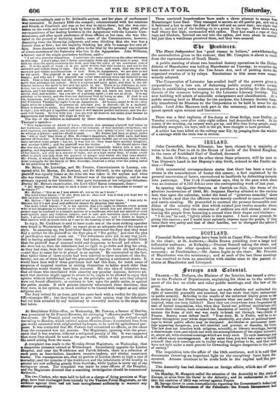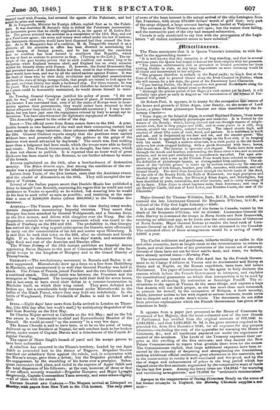loretga anb eolontal.
FRA.NCE.—M. Dnfaure, the Minister of the Interior, has issued a circu- lar to the Prefects of Departments, explaining his ideas as -to the enforce- ment of -the law on clubs and other public meetings, and the law of the press. He declares that the Constitution has not made absolute and unlimited the right of assembly peaceably and unarmed, but has made that right subservient to public security. Referring to the results of the unlimited liberty given to the clubs during the last fifteen months, he inquires what one useful idea they have inspired, what one duty fulfilled? Have they not everywhere been frequented by men of heated imagination, who, when they found our political institutions able to resist their violence, have attacked the foundation of society.? Through their success the flame of civil war was ready to break out through two-thirds of France. Society must defend itself. "Your duty, M. Is Prefet, will be to in- terdict throughout your whole department, absolutely, any clubs or political meet- ings in which public affairs may be discussed. Accidental or permanent meet- ings appearing dangerous, you will interdict and prevent, or dissolve, by force. The law does not interfere with religious, scientific, or literary meetings, havtD a determinate view, and which end with the accomplishment of the object intend or, above all, with electoral meetings which are truly such. To such meetings you will afford every encouragement. At the muse time, you will take care to satisfy yourself that such meetings are in reality what they profess to be, and that they were not held uuder a mere pretext for forwarding designs dangerous to the peace of society."
The inquisition into the affair Of the 13th continues, and it is said that documents throwing an important light on the conspiracy have been dis- covered. Arrests continue to be made 'both in the capital andstheprO- vinees.
The Assembly las had discussions on foreign affairs, Which-are of Mime interest.
On Monday, M. Mauguin called the attention of the Assembly to the State of Europe, in arms from the Ours! to the Atlantic; and he endeavouted to shoo' that the coalition of 1813 was revived against France.
M. Savoye threw in some interpelimions regarding the Government's behaviour to the Provisional Government of the Palatinate: the French Governraent had
leagued itself with Prussia, had arrested the agents of the Palatinate, and had wised its arms and money. IA. de Tocqueville, Minister for Foreign Affairs, replied first as to the Palati- sass It was doubtless M. Savoye's duty to defend the Palatinate insurrection; for documents prove that he chiefly originated it, as the agent of M. Ledru-Rol- tin. The person arrested was arrested as a conspirator of the 13th May, and not as a Palatinate agent: the arms and money were seized tinder the law of nations; the insurgents themselves would have been disarmed had they crossed the fron- tier. As to M. Mauguin's fear of a coalition, M. de Tocqueville treated it as a chimera: all his attention in office has been directed to ascertaining the secret designs of foreign powers, and he has acquired the conviction that no coalition has been formed to overthrow that Republic, which be was at least as anxious to preserve as they. (Turning to the Left.) The ex- ample of the past besides proves that no such coalition cad endure long or be dangerous while England remains aloof; and England has on every occasion wished for friendly terms with France. If, however, the Social Democratic flag bad prevailed here—if M. Ledru-Rollin had then stoodin that tribune—coalition there would have been, and war by all the united nations against France. It was the fault of those who by their daily revolutions and multiplied assassinations rendered the state of things insupportable, that people are turned to look again for the past, and that liberty has made a backward step. For these reasons, he was for peace. War would be a peril for France; and therefore he declared that so long as a peace could be honourably maintained, be would devote himself to main- tain it.
On Tuesday, General Cavaignao justified his policy of peace. "I did not wish for war," said he; "and if am a partisan of peace, of honourable peace, it is because I am convinced that, even if all the states of Europe were in insur- rection against their governments, they would rather have returned to their former allegiance than submit to us. (Considerablemavement) I may be mis- taken, but you have just seen the repugnance evinced by Italy to accept our in- tervention. You have also witnessed the diplomatic repugnance of Sardinia."
The Assembly passed to the order of the day.
ITALY.—The official news from Rome comes down to the 23d. A prac- ticable breach in two testions of the wall and their connecting curtain had been made by the siege batteries; three columns Marched on the night of the 22d. General Oudinot reports simply that the positions were carried Without loss; and presently adds' that "the gabions at the gorge of the bastions were much advanced by daybreak." The result was, that nothing more than a lodgment had been made, which the troops were able to fortify and retain. The French Government, it is thought, has later news, which it does not choose to publish. It is reported that an inner wall of great thickness has been reared by the Romans, to cut further advance by means of the breach.
Ancona capitulated on the 18th, after a bombardment of destructive severity. The Milan Gazette says, that among the conditions of the sur- render was a political amnesty for the inhabitants.
Letters from Turin, of the 21st instant, state that the Austrians evacu- ated the citadel of Alessandria on the 20th. They still occupied the ter- ritory of Valens& Several of the Italian papers assert that Daniele Martin has published a letter to himself fl om Kossuth, expressing his regret hat he could not send assistance to Venice so speedily as he wished, but assuring him he would do his best to send relief as soon as possible; and remitting at the same time a sum of 2,000,000 florins (about 200,0001.) to the Venetian Go- vernment.
Auseltra.—The Vienna papers, for the first time during many weeks, eontain despatches announcing Imperial victories. They assert that Georgey has been attacked by General Wohlgemuth, and a Russian force, on the 213t instant, and driven with slaughter over the Wang. But the despatches contain no reference to a cannonade which was heard to the South of Pressburg on the 22d and 23t1. The probability is, that Georgey has retired his right wing in good order across the Danube, more effectually to carry out the concentration of his left and centre upon CEdenberg. It is said that he took that town on the 28d, after au obstinate and bloody fight. If so, he threatens Vienna at two days' march, and menaces the right flank and rear of the Austrian and Russian allies.
The Wiener Zeilung of the 19th instant publishes an Imperial decree appointing Baron Haynau to the post of Commander-in-chief of the Im- perial troops in the kingdom of Hungary and in the Grand Dutcby of Transylvania.
GERMANY.—The revolutionary movement in Bavaria and Baden is al- most suppressed. Mieroslaweki drew up a force on a fine from Heidelberg to Manlaeirn, and manceuvered it so well that General Peucker was held in check. The Prince of Prussia joined Percker, and the two Generals made a combined attack. The chief battle was between the Prussians and the insurgents at Waegbausel. The insurgents held their field for seven hours, and at last seem to have owed their defeat to a counter-insurrection in Manheim itself, on which their wing rested. They were defeated and broken up; but a considerable body retreated under Mieroslawski to the defiles of the Black Forest, where they may hold out indefinitely. In the battle of 1Vaaghausel, Prince Frederick of Baden is said to have lost a limb.
Isnara.—Eight days' later news from India arrived in London on Thurs- day, (the fifth day after last week's mail,) by anticipatory despatches of the mail from Bombay on the 21st May. Sir Charles Napier arrived at Calcutta on the 6th May; and on the 7th Was sworn in as Commander-in-chief and Extraordinary Member of the Council. He would proceed "up the country" in a very few days.
The Ranee Chunda is said to have been, or to be on the point of being, delivered up to our Resident at Nepaul, for safe conduct back to her broken prison, under escort of Captain Martin and a detachment of the Fourth Ir- regular Cavalry.
The report of Shere Singh% breach of parol and his escape proves to have been unfounded.
A rebellion has occurred in the NIzam's territory, headed by one Appa Sahib as pretended heir to the throne of Nagpore. Brigadier Onslow marched our subsidiary force against the rebels, and, in cooperation with the Nizam's troops, gave them a defeat; but 'the Brigadier perished after the engagement, by the stumbling of his horee 'over a precipice. Subse- quent encounters took place, and ended in the capture of Apper Sahib and the total dispersion of his followers: at the cost, however, of three or four of our officers severely wounded—Brigadier Hampton and Major Lysaght dangerously, Captain Commandant Yates severely, and some others slightly --all of them with the sword.- ihrureo STATES AND Caesar:Pa.—The Magma arrived at Liverpool on lialaday, with papers from New.York -to the 18th instant. The only piece
of news of the least interest is the actual arrival of the ship Lexington from San Francisco, with about 370,000 dollars' worth of gold dust; only pail of the cargo shipped, a large amount having been landed at 'Valparaiso.
The crevasse at New Orleans was still open; but the waters were falling, and the mercantile part of the city had escaped submersion.
Canada is only mentioned to say that with the prorogatiou of the Legis- lature "all violent excitement seems to have subsided."



























 Previous page
Previous page